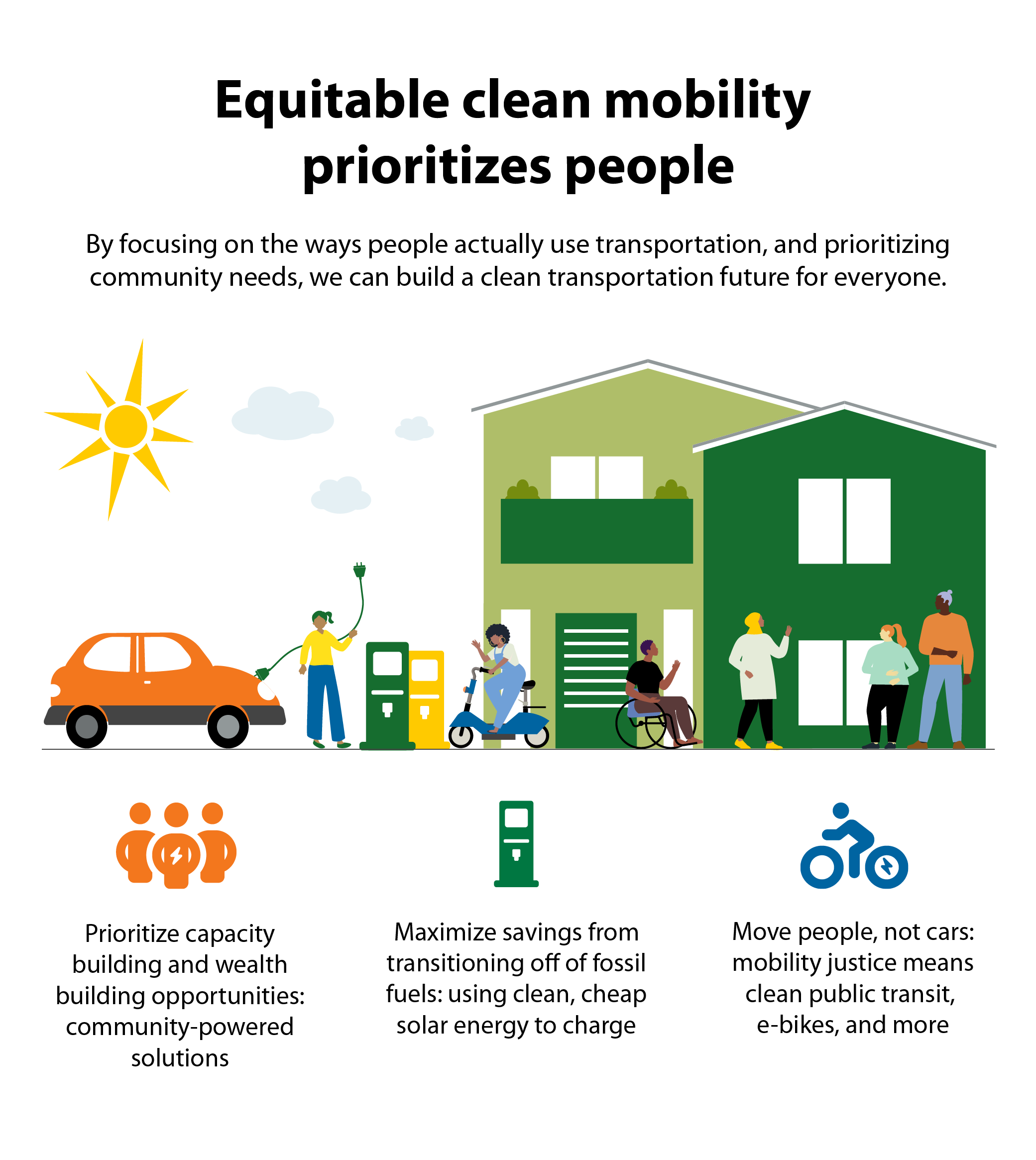We can’t leave anyone behind.
Racist housing and industrial policy has forced communities of color onto the frontlines of the climate change crisis. The transition to electric vehicles and clean mobility is a powerful opportunity for repair.
Access and inclusion are not the same as measurable, tangible benefits for our communities. To advance environmental and economic justice, we need solutions for every person who walks, bikes, takes public transit, or drives – whether they rent or own the home they commute from.
Together, we can build our clean mobility future – powered by people, not profit.
As part of GRID Alternatives’ vision of a transition to clean, renewable energy that includes everyone, we are making electric vehicles, electric vehicle charging and other clean mobility options more accessible to the communities we serve. This effort initially focused on California, in conjunction with investments from the California Air Resources Board (CARB) in low-carbon transportation equity programs, and has expanded to Colorado in partnership with Xcel Energy. We are also grateful for the support of the GM Climate Equity Fund.
Low-income families in the US spend approximately $75-$78 billion every year on gasoline. Communities of color are disproportionately impacted by pollution from both gasoline consumption and gasoline production, including disproportionate exposure to airborne lead poisoning from the era of leaded gasoline. By pairing electric vehicles and other modes of transportation with solar power, GRID Alternatives is helping families replace gasoline with sunshine, saving them money and replacing local air pollution with clean energy.
GRID Alternatives’ initial focus is supporting community outreach and helping qualified customers gain access to clean mobility options and charge electric vehicles with solar power by working with partner organizations implementing low-carbon transportation equity programs. Current program areas include:
-
Coordinated Outreach: GRID is partnering with the California Air Resources Board to administer its One-Stop-Shop pilot, a statewide project to create easy and comprehensive access to California’s clean transportation-related programs for residents and communities that have historically faced the most harm from environmental injustice. The project simplifies the pathway to clean transportation funding and other benefits by coordinating outreach and bringing the programs together in a single, easy-to-use platform.
-
Residential EV charging infrastructure: GRID is providing home Level 2 electric vehicle charging stations to eligible consumers throughout California, in partnership with Beneficial State Foundation and Community Housing Development Corporation, while providing employment and training opportunities for community members. This program is currently available to participants in the Clean Vehicle Assistance Program, Driving Clean Assistance Program, and other CARB-funded equity programs. GRID is developing partnerships with other stakeholders to expand this program to consumers outside of these programs, and also partnering with Ecology Action to pilot models for deploying charging infrastructure in multifamily affordable housing.
-
Subsidized public charging: For many renters and other EV drivers who are unable to charge at home, GRID has developed a new offering to provide subsidized access to the country's largest networks of Level 2 and DC Fast Charging public charging stations. This project is currently being deployed throughout California in partnership with EVgo, Beneficial State Foundation, and Community Housing Development Corporation.
-
"Scrap and Replace" programs: GRID is partnering with the Bay Area Air Quality Management District and Sacramento Metropolitan Air Quality Management District to help income-qualified California drivers scrap their older, high-polluting car and replace it with either an electric vehicle, or another zero-emission alternatives such as an e-bike or transit voucher. These programs are funded through the CARB Clean Cars 4 All program.
-
Community-Driven Models for Affordable Public EV Charging: Focused on Justice40 communities and in partnership with the Smart Electric Power Alliance (SEPA), Drive Clean Colorado, and EVNoire we aim to reduce the transportation cost burden and make EV ownership accessible to all. By developing scalable business models, this initiative ensures that everyone, regardless of income or housing type, can benefit from clean energy and mobility advancements. This program is funded by the Joint Office of Energy and Transportation. Visit the program page to Learn more.



